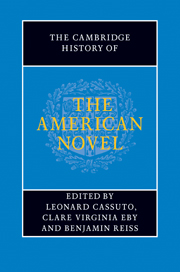Book contents
- Frontmatter
- General Introduction
- PART ONE INVENTING THE AMERICAN NOVEL
- PART TWO REALISM, PROTEST, ACCOMMODATION
- PART THREE MODERNISM AND BEYOND
- Introduction: modernism and beyond
- 37 Stein, Hemingway, and American modernisms
- 38 The Great Gatsby and the 1920s
- 39 Philosophy and the American novel
- 40 Steinbeck and the proletarian novel
- 41 The novel, mass culture, mass media
- 42 Wright, Hurston, and the direction of the African American novel
- 43 Ellison and Baldwin: aesthetics, activism, and the social order
- 44 Religion and the twentieth-century American novel
- 45 Faulkner and the Southern novel
- 46 Law and the American novel
- 47 Twentieth-century publishing and the rise of the paperback
- 48 The novel of crime, mystery, and suspense
- 49 US novels and US wars
- 50 Science fiction
- 51 Female genre fiction in the twentieth century
- 52 Children's novels
- 53 The American novel and the rise of the suburbs
- 54 The Jewish great American novel
- 55 The Beats and the 1960s
- 56 Literary feminisms
- 57 Reimagining genders and sexualities
- PART FOUR CONTEMPORARY FORMATIONS
- A selected bibliography
- Index
54 - The Jewish great American novel
from PART THREE - MODERNISM AND BEYOND
Published online by Cambridge University Press: 28 July 2011
- Frontmatter
- General Introduction
- PART ONE INVENTING THE AMERICAN NOVEL
- PART TWO REALISM, PROTEST, ACCOMMODATION
- PART THREE MODERNISM AND BEYOND
- Introduction: modernism and beyond
- 37 Stein, Hemingway, and American modernisms
- 38 The Great Gatsby and the 1920s
- 39 Philosophy and the American novel
- 40 Steinbeck and the proletarian novel
- 41 The novel, mass culture, mass media
- 42 Wright, Hurston, and the direction of the African American novel
- 43 Ellison and Baldwin: aesthetics, activism, and the social order
- 44 Religion and the twentieth-century American novel
- 45 Faulkner and the Southern novel
- 46 Law and the American novel
- 47 Twentieth-century publishing and the rise of the paperback
- 48 The novel of crime, mystery, and suspense
- 49 US novels and US wars
- 50 Science fiction
- 51 Female genre fiction in the twentieth century
- 52 Children's novels
- 53 The American novel and the rise of the suburbs
- 54 The Jewish great American novel
- 55 The Beats and the 1960s
- 56 Literary feminisms
- 57 Reimagining genders and sexualities
- PART FOUR CONTEMPORARY FORMATIONS
- A selected bibliography
- Index
Summary
In his 1957 essay “The University as Villain” Saul Bellow, an inveterate critic of academia, surprisingly affirms the university employment of writers. Arguing against the cult of “Experience” which declares, “Writers have always come out of the gutter. The gutter is their proper place,” Bellow contends, “The life of a civilized man is, increasingly, an internalized one, and towards this internalized life writers have been encouraged to take a gross and foolish attitude.” Thus, the university-based author “may find a Whitehead or an Einstein as well worth writing about as saloon-keepers or big game hunters.” This should remind us that not only have many of Bellow's protagonists – Moses Herzog, Albert Corde, Abe Ravelstein – been academics, but even the most active ones – Augie March, Eugene Henderson – have been decidedly introspective. More than a surprising amendment to Bellow's anti-academic stance, his comments limn the formal program of what might be called the Jewish great American novel: the transition from the cult of experience identified with Ernest Hemingway and its replacement by a form of realism grounded in the representation of characters’ cognitive and emotional states. In the hands of Bellow, Norman Mailer, and Philip Roth, the American novel abandoned an increasingly stereotyped realm of manly action and renewed itself via the sweepingly ambitious depiction of what Amy Hungerford calls, with reference to Bellow's books, “the thinking, self-contradicting, peculiar mind of a particular individual.”
- Type
- Chapter
- Information
- The Cambridge History of the American Novel , pp. 893 - 908Publisher: Cambridge University PressPrint publication year: 2011



